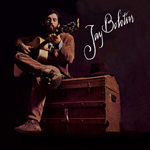|
|
 |
Dusted Reviews
Artist: Jay Bolotin Album: Jay Bolotin Label: Locust Review date: Nov. 25, 2009 |

|
|
|
 |
Another in the parade of long-lost singer-songwriter records recently recovered and dusted off for contemporary consideration, Jay Bolotin’s self-titled debut has been out of circulation almost since its 1970 release. (Since that time, Jay Bolotin has had an interesting career, writing a song for Dan Fogelberg, earning Kris Kristofferson’s admiration, writing an opera and creating a film out of animated woodcuts called The Jackleg Testament.) Recorded in New York City, with bassist Kenny Lyon, keyboard player Mark Taber, guitarist David Mowry and Bobby Mason of the Fugs on drums, the album has a quiet intensity. Its sureness and maturity are surprising, given that the songwriter was only 17 or 18 years old at the time.
The songs are a shadowy mix of Appalachian folk, blues and country. In “Dear Father,” for instance, a delicate web of guitar picking evokes Bolotin’s Kentucky roots, while Mowry’s blues lead lends a smoke and heat not unlike Richard Thompson’s work in Fairport Convention. Bolotin’s voice – echoey, dramatic and full of shadings – is pitched somewhere between Bert Jansch and Johnny Cash. And the song, though grounded in a very traditional web of influences, turns surreal with visions of snakes swallowing their own tails. If you had to imagine what it would sound like for a backwoods country boy to discover late-1960s psychedelia (and possibly pharmaceuticals), this would be it.
The album’s best song, “It’s All in That,” has the slash and swagger of Richard Farina’s work, the drums pumped up, a barroom piano tinkling wildly in the background, bent blues notes floating up over the haze. At the center of the song is a mystic’s declaration of the one-ness of things, which is very 1960s (“It’s all in that/in the pebbles on the shore/my woman sleeps/and my child will be born/how could I ask for more?”).
It is also the first evidence of Bolotin’s fascination with women and fertility, which continues through the rest of the album, and is perhaps its oddest element. “Winter Woman,” near the end of the album, delves most deeply into this subject, describing a romance deep in the north country that results in a pregnancy. Racily for its time, the song even includes a description of breast-feeding. And yet, there is something weirdly off about the way Bolotin describes women, as if he doesn’t have the slightest idea of who they are or what makes them run. He practically wants a medal for staying around until Winter Woman gives birth and leaves soon after. Moreover, he seems to consider knocking the girl up – in what is clearly a very traditional society (she herds goats) – as some sort of favor. My guess is that single motherhood in, oh say, Sasketchewan in the early 1970s, was kind of a drag.
This sort of gender ickiness (it turns up in “You Are a Woman,” too) is of its time and, if nothing else, reminds you of how sexist the free-loving 1960s and 1970s could be. Still it’s a very pretty album, well worth resuscitating, even if it does keep its womenfolk barefoot and pregnant.
By Jennifer Kelly
|







